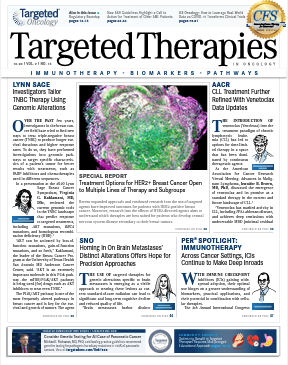Enhanced Radioisotope Yields Unique Therapeutic CLR 131 in Lymphoplasmacytic Lymphoma
The CLOVER-1 study is testing CLR 131 in patients with relapsed or refractory non-Hodgkin lymphoma, including lymphoplasmacytic lymphoma and Waldenström macroglobulinemia.
Arjun V. Balar, MD

It's pretty rare to ever see a clinical trial of a novel therapy report a 100% overall response rate in the studied population, which is why the initial data reported at the American Association for Cancer Research malignant lymphoma conference from the CLOVER-1 study, a phase 2 trial of CLR 131, caught my eye (NCT02952508). Sadly, the study reported data from only the 4 initial patients enrolled, but it is still safe to say that this novel agent, a unique blend of radioisotope and drug-conjugate technologies to generate a first-in-class cancer therapeutic, could be something special.
CLR 131 is a proprietary phospholipid ether conjugated to iodine 131, which is a radioisotope previously well established in the treatment of advanced thyroid cancer. The phospholipid ether moiety of CLR 131 is selectively taken up by lipid raft microdomains that are expressed on tumor cells, leading to intracellular accumulation in the cytoplasm and subsequent cancer cell death.
Normal cells, theoretically, do not express the same lipid raft microdomains and thus do not take up CLR 131, limiting off-target toxicity. The CLOVER-1 study is testing this novel agent in patients with relapsed or refractory non-Hodgkin lymphoma, including lymphoplasmacytic lymphoma and Waldenström macroglobulinemia. In an effort to always be fully transparent, as a genitourinary medical oncologist, I admit I do not have expertise in treating patients with these conditions, but my sense is that after commonly used standard agents such as rituximab (Rituxan), ibrutinib (Imbruvica), and/or autologous stem cell transplant, few effective treatment options exist.
Normal cells, theoretically, do not express the same lipid raft microdomains and thus do not take up CLR 131, limiting off-target toxicity. The CLOVER-1 study is testing this novel agent in patients with relapsed or refractory non-Hodgkin lymphoma, including lymphoplasmacytic lymphoma and Waldenström macroglobulinemia. In an effort to always be fully transparent, as a genitourinary medical oncologist, I admit I do not have expertise in treating patients with these conditions, but my sense is that after commonly used standard agents such as rituximab (Rituxan), ibrutinib (Imbruvica), and/or autologous stem cell transplant, few effective treatment options exist.

Survivorship Care Promotes Evidence-Based Approaches for Quality of Life and Beyond
March 21st 2025Frank J. Penedo, PhD, explains the challenges of survivorship care for patients with cancer and how he implements programs to support patients’ emotional, physical, and practical needs.
Read More
Examining the Non-Hodgkin Lymphoma Treatment Paradigm
July 15th 2022In season 3, episode 6 of Targeted Talks, Yazan Samhouri, MD, discusses the exciting new agents for the treatment of non-Hodgkin lymphoma, the clinical trials that support their use, and hopes for the future of treatment.
Listen